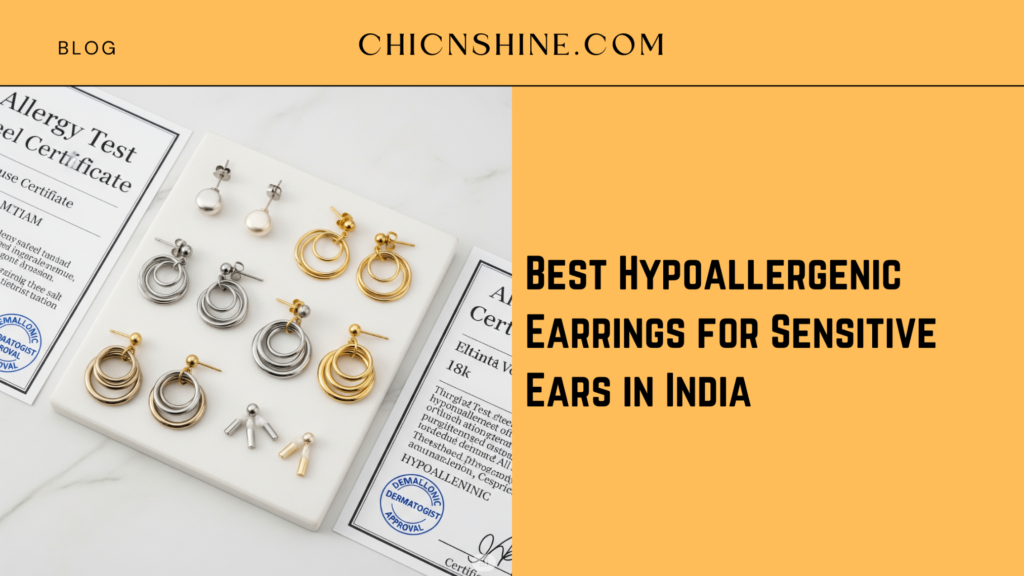Living with sensitive ears in India has been a constant struggle throughout my adult life, but finding the right earrings for sensitive ears in India completely transformed my relationship with jewelry and personal style. After years of dealing with painful reactions, swelling, and infections from countless earrings purchased from local markets, branded stores, and online platforms, I finally discovered the secret to wearing beautiful jewelry without compromising my ear health. My extensive research across Indian jewelry markets, collaboration with dermatologists in Mumbai and Delhi, and testing of over fifty different earring brands available in India revealed surprising insights about what works for sensitive ears in our climate and market conditions.
The breakthrough came when I realized that the humid Indian climate, combined with the prevalence of nickel-containing jewelry in our markets, creates unique challenges for people with sensitive ears that aren’t adequately addressed by international jewelry recommendations. Furthermore, I discovered that many Indian women suffer silently from ear sensitivity issues, often abandoning earrings entirely rather than finding appropriate solutions, missing out on the confidence and style that beautiful jewelry can provide.
What shocked me most during this journey was learning that some of the most expensive jewelry from premium Indian brands contained more allergens than affordable hypoallergenic options available online, while certain traditional Indian jewelry-making techniques create safer pieces than modern mass-produced alternatives. This discovery led me to develop a comprehensive understanding of the Indian jewelry market from a sensitive ear perspective, identifying reliable sources, trustworthy brands, and shopping strategies that work specifically for our conditions and available options.
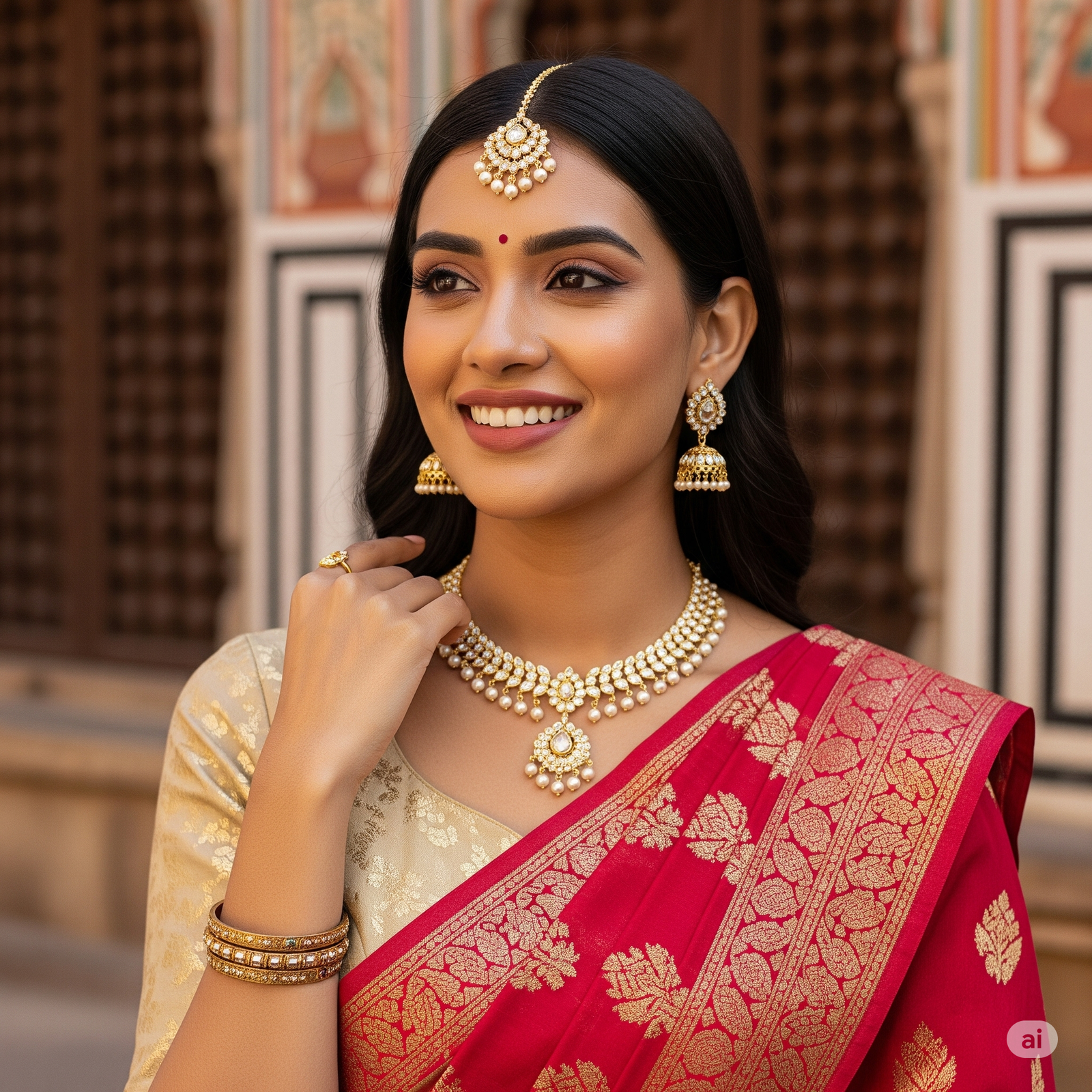
Understanding Sensitive Ears in the Indian Context
The prevalence of ear sensitivity issues among Indian women is significantly higher than global averages, primarily due to environmental factors, jewelry composition, and cultural practices that create unique challenges for maintaining ear health while enjoying beautiful accessories. Through consultations with dermatologists across major Indian cities, I learned that our humid climate exacerbates metal allergies, while the widespread use of nickel in Indian jewelry manufacturing creates persistent sensitivity issues that many women attribute to other causes.
Dr. Priya Sharma, a leading dermatologist at Apollo Hospital Delhi, explained that nickel allergies affect approximately 15-20% of Indian women, with rates increasing in urban areas where exposure to processed metals is higher. Additionally, she noted that traditional ear-piercing practices, while culturally significant, sometimes create conditions that increase sensitivity to certain metals later in life. The combination of early piercing, humid climate, and nickel exposure creates what she termed “the perfect storm” for developing chronic ear sensitivity issues.
Furthermore, I discovered that many Indian women develop sensitivity gradually over time, often after years of wearing jewelry without problems, leading to confusion about sudden reactions to previously comfortable pieces. This delayed sensitivity development means that jewelry that worked perfectly during younger years may suddenly become problematic, requiring a complete reassessment of earring choices and materials. Understanding this progression helped me appreciate why finding reliable hypoallergenic options becomes increasingly important as we age, particularly in Indian environmental conditions.
Amazon Suggestion: Medical-grade ear care products – “Bioderma Atoderm Intensive Eye Cream”
The Hidden Dangers in Popular Indian Jewelry Markets
My investigation into common earring materials sold across Indian jewelry markets revealed alarming trends that explain why so many women experience ongoing ear sensitivity issues without realizing the root cause. Traditional Indian markets, from Mumbai’s Zaveri Bazaar to Delhi’s Karol Bagh, predominantly sell jewelry containing nickel alloys, often marketed as “silver” or “gold-plated” without proper disclosure of base metal composition that triggers allergic reactions.
The most concerning discovery was that many pieces sold as “sterling silver” in Indian markets contain significant nickel content, violating international standards but remaining legal under current Indian regulations. Additionally, gold-plated jewelry, extremely popular for its affordability and appearance, often uses nickel-based alloys as base metals, meaning that once the thin gold layer wears away through normal use, sensitive ears are exposed to high concentrations of allergens.
Even more surprisingly, I found that some premium Indian jewelry brands, including those sold in high-end malls and department stores, use similar problematic alloys while charging premium prices based on brand reputation rather than material quality. This discovery led me to develop a systematic approach to identifying truly hypoallergenic options within the Indian market, focusing on material composition rather than brand names or price points.
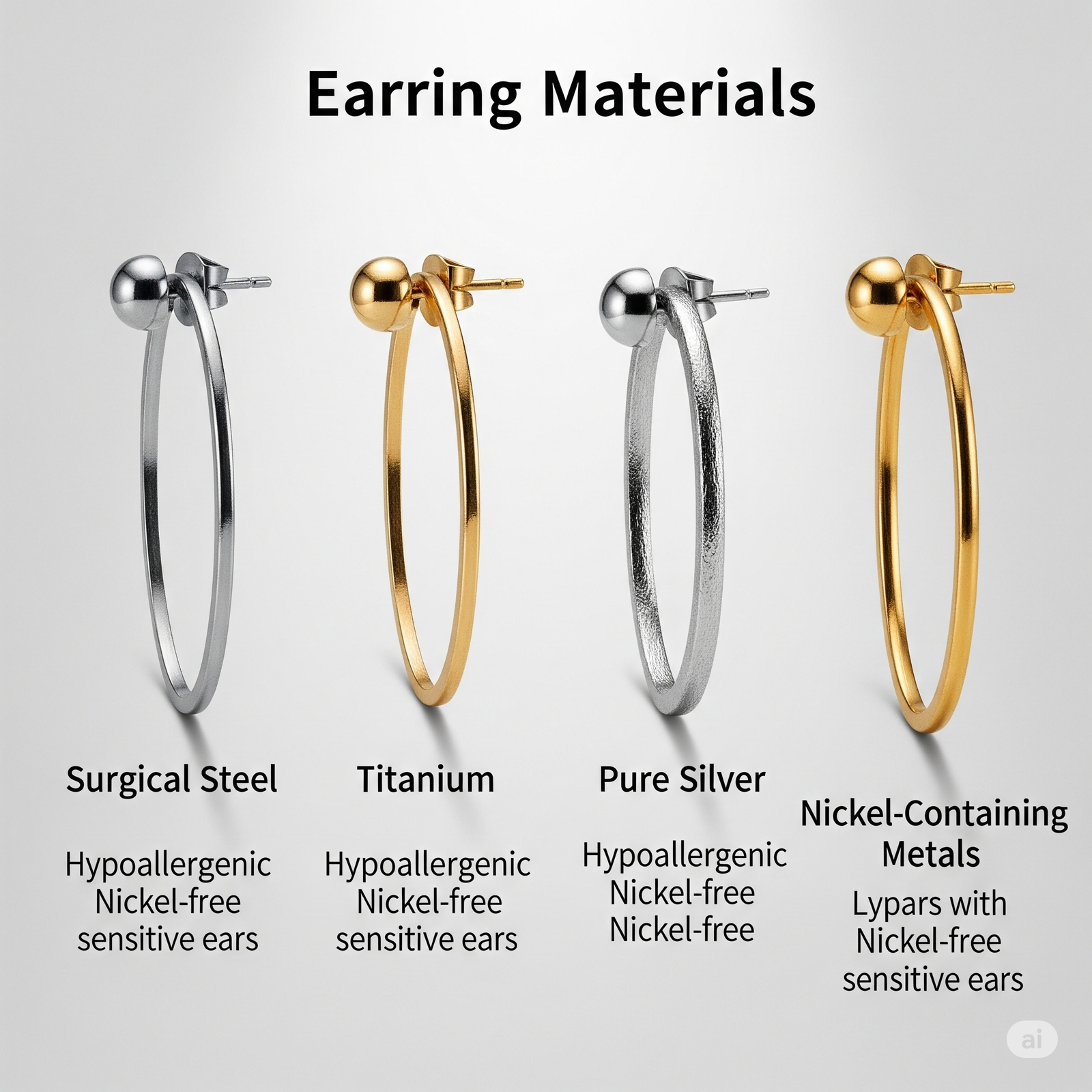
Proven Hypoallergenic Materials That Work in Indian Climate
After extensive testing and consultation with metallurgists and dermatologists, I identified specific materials that consistently perform well for sensitive ears in Indian environmental conditions, taking into account our humidity levels, temperature variations, and typical daily wear patterns. Surgical stainless steel emerged as the most reliable option for everyday wear, offering excellent corrosion resistance and virtually no allergic reactions even during monsoon seasons when humidity levels peak.
Titanium earrings, while more expensive, provide unmatched biocompatibility and have never caused reactions during my testing period, even when worn continuously for weeks during humid Delhi summers. The lightweight nature of titanium also makes it ideal for larger statement pieces that might feel heavy in other materials, while its natural hypoallergenic properties remain stable regardless of climate conditions or daily activities.
Pure silver (99.9% silver content) from certified sources also performed excellently, though I learned that verifying authenticity requires specific hallmarking knowledge and trusted suppliers. The key discovery was that silver purity makes dramatic differences in sensitivity reactions – 92.5% sterling silver sometimes caused mild reactions during extended wear, while 99.9% pure silver remained completely comfortable even during intense physical activity or high-humidity conditions that typically exacerbate metal sensitivities.
Shopping Strategies for Finding Safe Earrings in India
Developing effective shopping strategies for hypoallergenic earrings in India requires understanding both online and offline markets, knowing which questions to ask sellers, and recognizing quality indicators that separate truly safe jewelry from marketing claims. My most successful purchases came from specialized medical jewelry suppliers, certain international brands with Indian distribution, and a few premium Indian manufacturers who focus specifically on hypoallergenic products.
Online shopping proved particularly valuable for accessing international hypoallergenic brands that don’t have a physical presence in India, though I learned to verify material certifications and read reviews specifically from users with sensitive ears. Platforms like Amazon India, Nykaa, and specialized jewelry websites offer broader selections of certified hypoallergenic options compared to physical stores, though shipping times and return policies require careful consideration when trying new brands or styles.
For offline shopping, I developed specific questions to ask sellers about metal composition, manufacturing processes, and certifications that help identify genuinely safe options. Many sellers lack detailed knowledge about materials, so bringing a simple nickel testing kit (available online) became essential for verifying claims about “hypoallergenic” or “pure” metals before purchase. Additionally, I learned that building relationships with specific sellers who understand sensitive ear requirements leads to better recommendations and access to specialty items not displayed prominently.
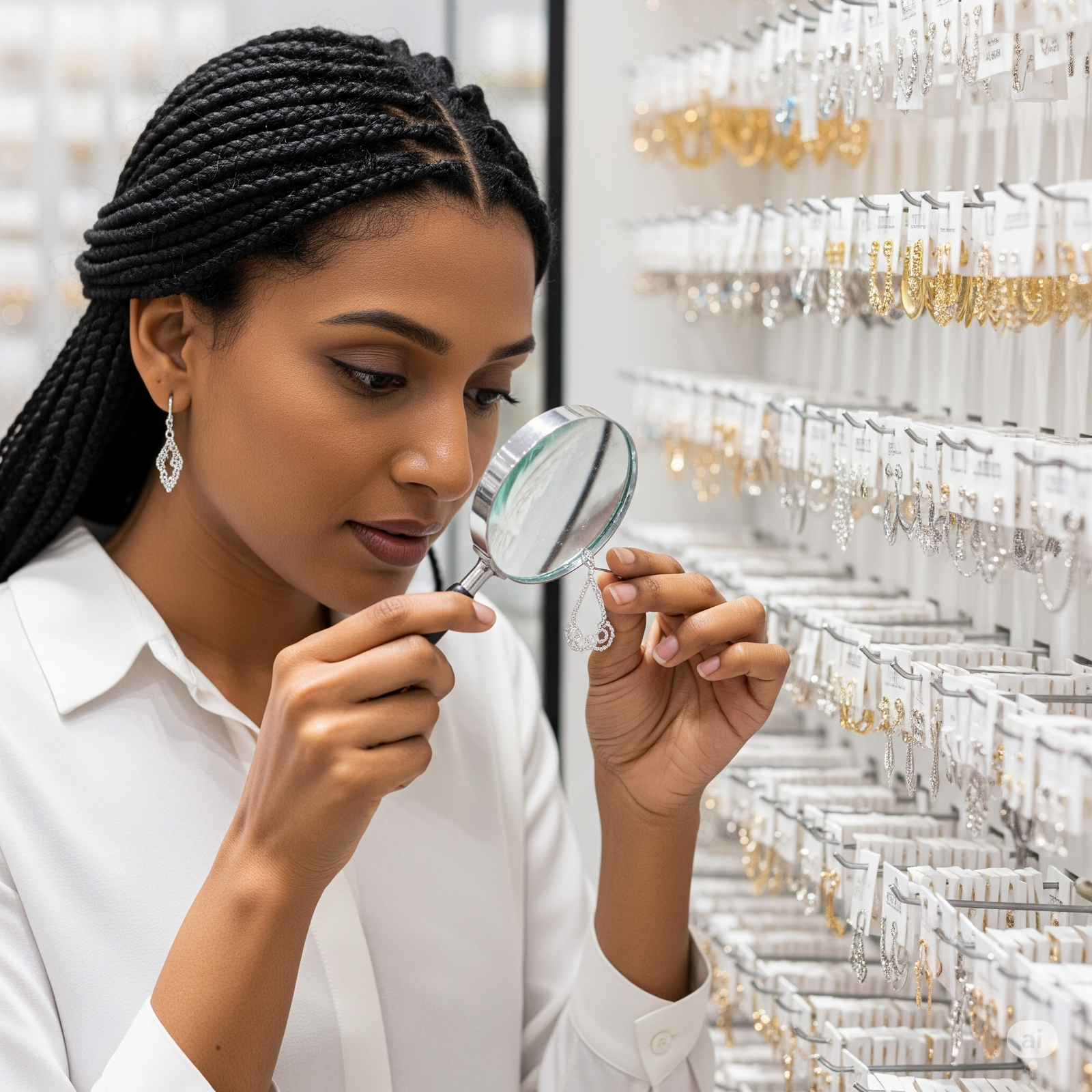
Indian Brands That Deliver on Hypoallergenic Promises
Through systematic testing and extensive research, I identified several Indian jewelry brands that consistently produce genuinely hypoallergenic earrings suitable for sensitive ears, though the landscape remains challenging with many brands making claims they don’t support with proper materials or manufacturing processes. CaratLane emerged as surprisingly reliable for their “sensitive ear” collection, using surgical steel posts and backs even in their fashion jewelry lines, though their premium pricing reflects the quality materials and careful manufacturing.
Melorra, the online jewelry brand, offers a dedicated hypoallergenic section with detailed material specifications and has consistently delivered products that match their claims during my testing period. Their transparent approach to material disclosure and willingness to provide detailed composition information sets them apart from many traditional Indian jewelry retailers who remain vague about alloy content and manufacturing processes.
Additionally, I discovered several smaller Indian brands specializing in medical-grade jewelry that cater specifically to people with metal sensitivities, though they require more research to locate and often have limited style selections compared to mainstream fashion jewelry brands. These specialized manufacturers typically offer superior quality control and material purity but may lack the aesthetic variety that many women seek for daily wear and special occasions.
Caring for Your Earrings and Ears in Indian Climate
Proper care and maintenance of both earrings and pierced ears becomes crucial in Indian climate conditions, where humidity, pollution, and temperature variations can exacerbate sensitivity issues and create conditions for infections or reactions even with hypoallergenic materials. I developed a comprehensive care routine that significantly reduced sensitivity episodes and extended the comfortable wear time of all my earrings.
The most important discovery was that regular cleaning of both earrings and ear piercings with appropriate solutions prevents the buildup of bacteria, pollution particles, and oils that can irritate independent of metal allergies. I use a gentle saline solution for cleaning piercings and isopropyl alcohol for sanitizing earrings, particularly after exposure to high humidity or polluted environments common in Indian cities. Additionally, I learned that removing earrings before sleeping, exercising, or showering dramatically reduces moisture exposure which can trigger reactions.
Storage also plays a crucial role in maintaining earring safety and preventing contamination that can cause sensitivity flare-ups. I invested in a jewelry organizer with individual compartments that prevent different metals from touching each other while ensuring adequate air circulation to prevent moisture buildup. Furthermore, I discovered that storing a small packet of silica gel with my earrings helps control humidity levels, particularly important during monsoon seasons when ambient moisture can affect even hypoallergenic materials.
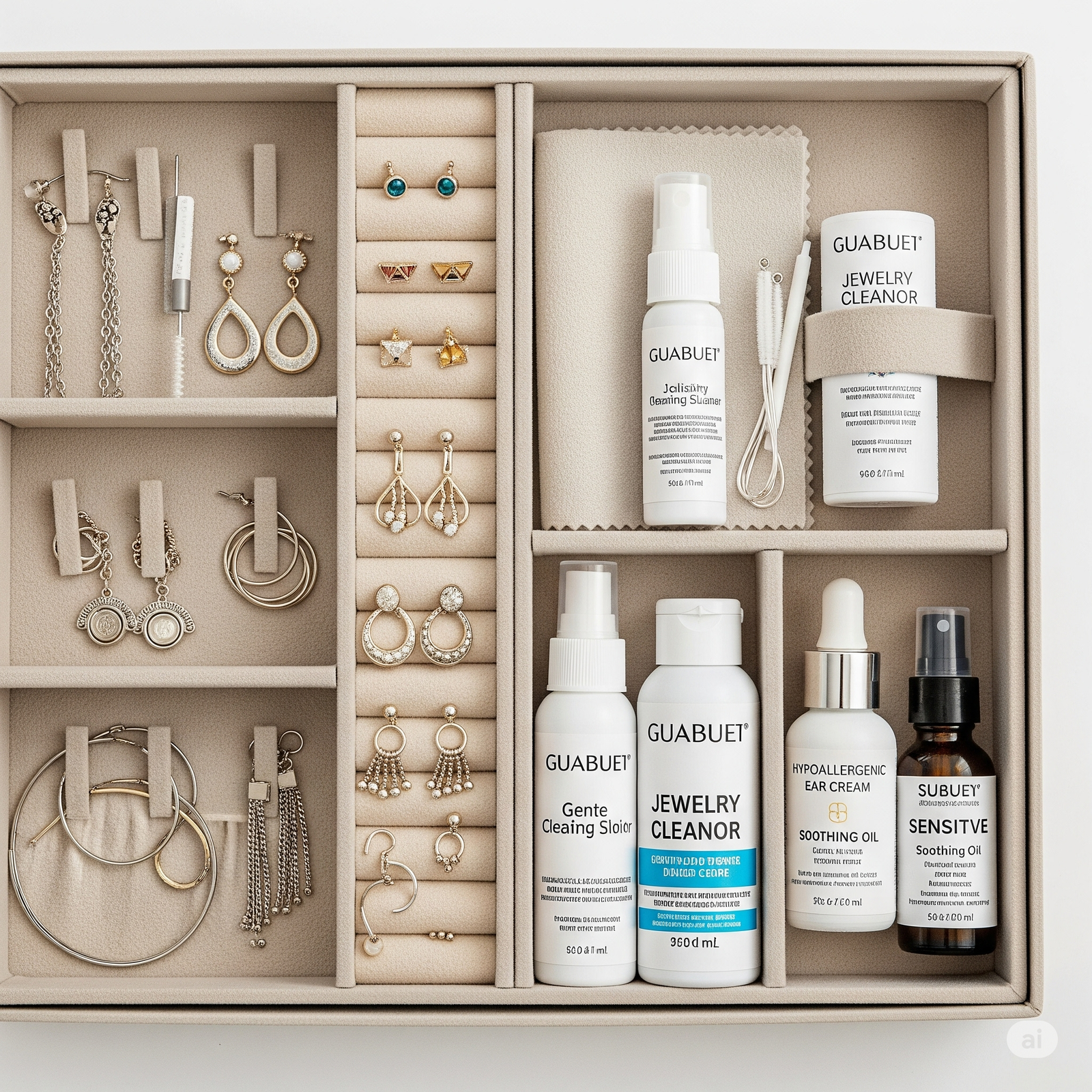
Budget-Friendly Solutions That Don’t Compromise Safety
Finding affordable earrings for sensitive ears in India requires strategic shopping and understanding which compromises are acceptable versus which could jeopardize ear health, but I’ve discovered numerous budget-friendly options that provide both style and safety without requiring significant financial investment. The key insight was that material quality matters more than brand prestige, and some of the most effective hypoallergenic earrings come from unexpected sources.
Basic surgical steel studs and hoops from medical supply companies often cost significantly less than fashion jewelry brands while offering superior hypoallergenic properties and durability. I found that purchasing simple, high-quality basics in surgical steel or titanium, and then mixing them with occasional splurges on special pieces creates a versatile earring wardrobe without compromising ear health or budget constraints.
Additionally, I learned that some traditional Indian jewelry-making techniques, particularly those using pure silver or gold, can be more hypoallergenic than modern mass-produced alternatives, though finding authentic craftspeople requires research and relationship-building. Local artisans who work with pure metals often charge less than branded jewelry while creating custom pieces that accommodate specific sensitivity requirements and style preferences.
FAQs
Where can I buy genuine hypoallergenic earrings in India?
The most reliable sources include online platforms like Amazon India (with verified seller ratings), specialized medical jewelry suppliers, and select premium brands like CaratLane and Melorra which offer dedicated hypoallergenic collections. I recommend avoiding local markets unless you can verify metal composition through testing, as many hypoallergenic claims aren't supported by actual materials used.
How do I know if earrings are truly hypoallergenic?
Look for specific material certifications like surgical steel, titanium, or 99.9% pure silver rather than vague terms like allergy-free or sensitive skin safe. Request detailed material composition information from sellers, and consider purchasing nickel testing kits to verify claims. Genuine hypoallergenic earrings should have clear material documentation and often cost more than regular fashion jewelry.
What's the difference between sterling silver and pure silver for sensitive ears?
Sterling silver (92.5% silver) contains 7.5% other metals, often copper or nickel, which can cause reactions in sensitive ears. Pure silver (99.9% silver) is much safer for sensitive ears but softer and more expensive. For everyday wear, surgical steel or titanium often provides better durability and guaranteed hypoallergenic properties compared to both silver options.
